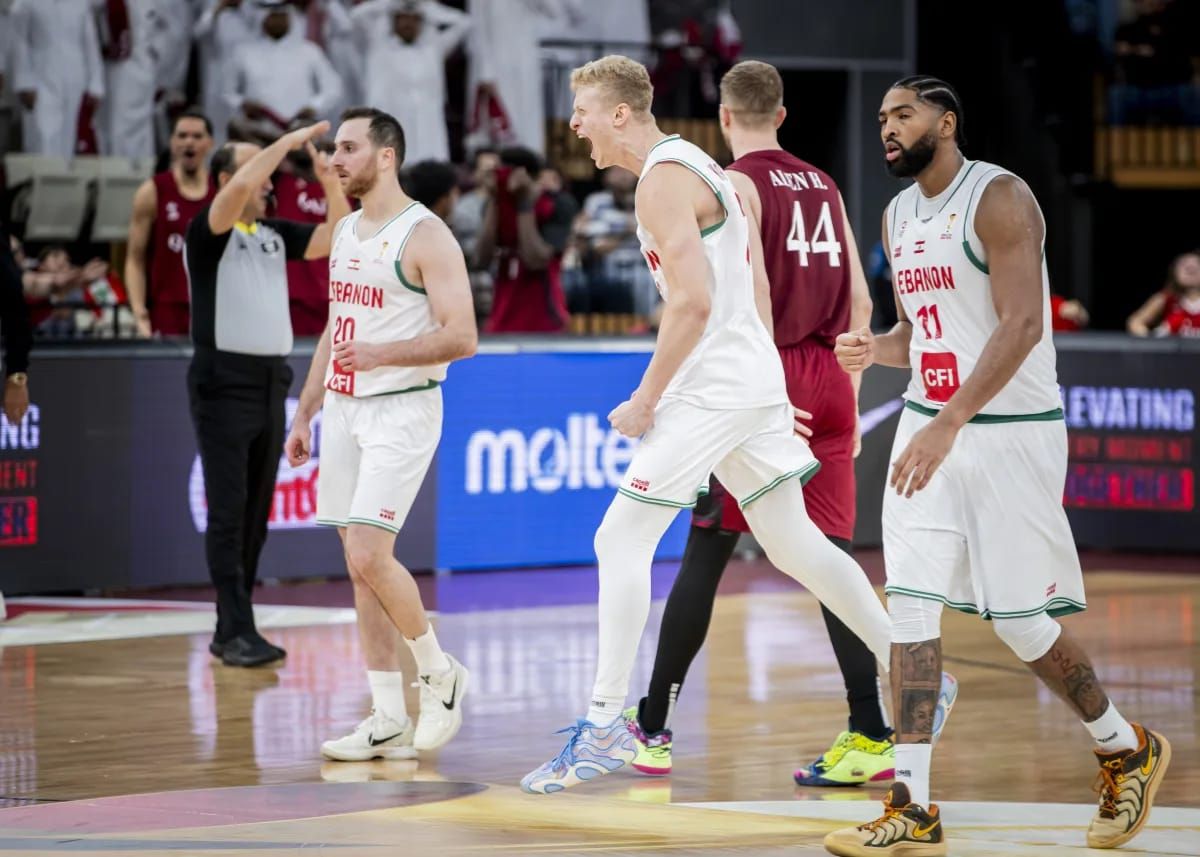
Down by ten, resurrected from nowhere, pushed to the brink on the final possession — Lebanon launched its 2027 World Cup qualifying campaign with a cliffhanger win over Qatar (75–74) in Lusail. A one-point thriller, 16 lead changes, and one hero to seal the night: Youssef Khayat. For newly-appointed head coach Ahmad Farran, it was a first victory as “ugly” as it was priceless.
In Doha, the script had everything to become the perfect trap. Facing Lebanon was a Qatari team already qualified by default for the 2027 World Cup as host nation, but in full “resurgence” and determined to send a message to the rest of Asia. Opposite them, a Lebanese team favored on paper, 30th in the FIBA rankings, with a new coach on the bench, balance still to be found, and the obligation to start Window 1 strong. On the court of the Lusail Multipurpose Hall, the matchup delivered on all expectations: a controlled first half, a final quarter of total alarm, and ultimately a snatched victory that says a lot about the character of this group.
A Start Like a Steamroller
From the opening tip, Lebanon imposed its law. Aggressive defense, secured rebounding, clean offensive execution: Wael Arakji and his teammates suffocated the hosts. The first quarter was one-sided, 21–9 for the visitors, with Qatar limited to difficult shots and unable to find its rhythm.
The second quarter logically saw a reaction from Hakan Dakir’s men. Sharper toward the rim, more inspired offensively, the Qataris scored 17 points against only 12 for Lebanon. At halftime, the gap shrank (33–26), but the Cedars still seemed in control: the system worked, the game plan held, the crowd was loud but the scoreboard remained favorable.
Returning from the locker room, the game changed soul. Brandon Goodwin, the American point guard of Qatar’s national team, began to heat up. Aggressive drives, tough shots converted, smart pick-and-roll reads: Lusail woke up. The third quarter still ended tied (17–17), and Lebanon started the last period with a seven-point lead (50–43). One could believe in a controlled ending. One would be wrong.
The Blackout and the Goodwin Show
Start of the fourth quarter: Lebanon pushes its lead to +10, as if to close the file once and for all. And then everything switches. In less than two minutes, Qatar hits a lightning 13–0 run. Lebanon’s defense breaks, the offense stalls, turnovers come in waves. The crowd swings into the game, Goodwin becomes unplayable, and the hosts take a three-point lead.
From there, it turns into a real psychological arm-wrestle. FIBA will later count 16 lead changes throughout the game: a statistic that perfectly sums up this suffocating money-time. Every possession is priceless, every free throw feels like a match-point. Lebanon ties, goes ahead, gets caught again. Qatar responds to every attempted break, carried by an incandescent Goodwin, author of 17 points, most of them after halftime.
Khayat, a Lay-Up for the History Books
And then comes that famous play, 17 seconds before the buzzer. The score is tied, time stretches. The ball lands in the hands of Youssef Khayat. After a complicated first half — “I had a bad first half, I had to rely a lot on my teammates at the end,” he would say — the Lebanese forward drives to the basket, slips through the paint, and drops an acrobatic lay-up that gives Lebanon a one-point lead. Just a simple two-point field goal on the stat sheet, but an enormous shift in the minds of both teams.
One last possession remains to defend. Qatar sets up a play to chase the game-winner, Goodwin and his teammates try to force the decision — but the Lebanese defense closes the curtain: good help, good contest, no clean shot. The ball doesn’t drop, the buzzer sounds, and Lebanon escapes with a 75–74 win. One more “cliffhanger” between these two teams after several crazy endings in recent months.
Arakji the Leader, Goodwin the Poison
On the stat sheet, the leaders delivered.
On the Lebanese side, Wael Arakji produced a captain’s game: 19 points, 7 rebounds, 2 assists, important shots in key moments, and constant presence to slow the pace when everything threatened to explode. Around him, the rotation held strong: Dedric Lawson (9 points, 12 rebounds) dominated on the boards, Ali Haidar (10 points, 4 rebounds) brought his touch in the paint, while Khayat (9 points, 6 rebounds), Karim Zeinoun (9 points, 4 rebounds), Gerard Hadidian (8 points) and Sergio El Darwich (7 points, 5 rebounds, 6 assists) each added an essential piece to the final success.
Opposite, Brandon Goodwin embodied constant danger. If Qatar hung on, returned and nearly stole the victory, it was largely thanks to him. Seventeen points, most of them after halftime, and an ability to shift momentum nearly by himself. Beside him, point guard Moustafa Fouda summed up the evening with a lucid sentence:
“We really battled for 40 minutes even if we started slow. It came down to small details, maybe a bit of luck at the end.”
The Numbers Confirm the Intensity
The statistics also tell the story of a high-tension match.
Lebanon shot better (42% vs 37%), dominated the rebounds (45–40), but allowed Qatar to shine in activity on passing lanes (17 assists and 16 steals for Qatar, versus 15 and 9 for Lebanon). A sign of a duel where every mistake was punished instantly, for both sides.
FIBA called it “a game destined to enter the Asian Qualifiers archives.” And it’s hard to disagree: a furious comeback, a one-point finish, a young forward assuming responsibility in the clutch, a favorite that wobbled but did not break.
“An Ugly Win,” but a Foundational One
At the final buzzer, Ahmad Farran did not try to hide anything:
“Thanks to God for this win… It’s an ugly victory, but we’ll take it any day. It’s a good start to our campaign. It’s my first win as national team coach, so it means a lot to me.”
An ugly win, perhaps — but often, these are the ones that shape campaigns. Those where the team does not roll, absorbs enemy runs, flirts with disaster but finds a way to survive anyway. “Lebanon will always find a way to win,” concluded FIBA. Once again, Lebanon proved it knows how to win even when the basketball is far from perfect.
Qatar, meanwhile, sends a very different message. Already qualified for 2027, the host country shows it won’t settle for just organizing.
“Our goal is to take Qatari basketball to the highest level in Asia,” said coach Hakan Dakir. Judging by their performance against one of the continent’s heavyweights, other nations have been warned: this team will not be a mere spectator on home soil.
Next Stop: Zouk Mikaël
Next stop is home, on Sunday the 30th, in the fiery Nohad Nawfal Arena in Zouk Mikaël, for the second round against Qatar. And there, it won’t be enough to survive on a golden lay-up — Lebanon will have to turn this narrow margin into a true show of force. If Lebanon wants to aim high by 2027, it must prove it can do more than win at the buzzer: impose its tempo, impose its basketball, and remind all of Asia that a Cedar, once it takes root, is not meant to tremble.




Comments